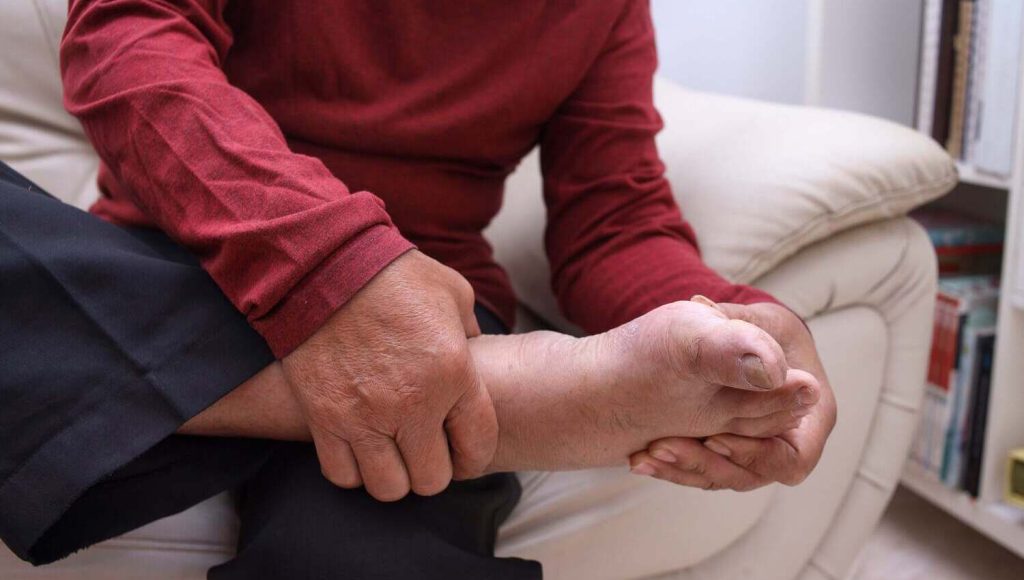Medical Marijuana For Neuropathy
- John DiBella
- Published: August 15, 2023
- Fact-checked by Dr. Desiree Granados

Neuropathy, a condition characterized by damage to the peripheral nerves, can lead to chronic pain, numbness, and weakness, significantly impacting the quality of life for those affected. Traditional treatments often fall short of providing effective relief, leading many to explore alternative options. One such option gaining traction is medical marijuana.
What is Neuropathy and What are the Symptoms?
Neuropathy, also referred to as peripheral neuropathy, is a condition that results from damage to the peripheral nerves, which are responsible for transmitting signals between the central nervous system and the rest of the body. A variety of factors can cause this nerve damage, including diseases like diabetes, injuries, infections, and certain medications.
The symptoms of neuropathy can vary widely depending on the nerves affected, but they often include numbness, tingling, or prickling sensations, often in the hands or feet; sharp, throbbing, or burning pain, particularly at night; extreme sensitivity to touch, and muscle weakness or paralysis.
In severe cases, patients may experience changes in blood pressure, irregular heart rate, or issues with digestion, all of which are a result of nerve damage in the autonomic nerves that control these bodily functions. It’s crucial to see a healthcare professional if you suspect you have neuropathy, as early diagnosis and treatment can slow or prevent further nerve damage.
Can Medical Marijuana Treat Neuropathy?
Medical marijuana is increasingly being considered as a potential treatment for neuropathy. Studies suggest that the cannabinoids in medical marijuana can interact with the endocannabinoid system in the human body, a system thought to play a role in pain management. Some patients report that medical marijuana provides relief from neuropathic pain symptoms, reducing their reliance on traditional pain medications.
However, research in this area is still ongoing and conclusive evidence to support the use of medical marijuana for neuropathy is yet to be established. As with all medical treatments, consultation with a healthcare provider is essential before using medical cannabis products.

Benefits and Risks of Using Medical Cannabis for Neuropathy
Benefits of Medical Cannabis for Neuropathy
Medical cannabis has shown promising results in managing neuropathic pain. Its active compounds, CBD and THC, interact primarily with our body’s endocannabinoid system, potentially relieving chronic pain and reducing inflammation. Additionally, medical cannabis can help alleviate associated symptoms such as anxiety and insomnia, thereby improving patients’ quality of life.
Risks of Medical Cannabis for Neuropathy
Despite these potential benefits, some risks accompany the use of medical cannabis. Side effects may include dizziness, impaired memory, and mood changes. Long-term use can lead to dependence and withdrawal symptoms. Furthermore, smoking cannabis can harm lung health, and the dosing can be difficult to control. It’s crucial for patients to consult with healthcare professionals before initiating cannabis treatment for neuropathy.
How to Use Medical Marijuana for Neuropathy
Medical marijuana can be consumed in various forms, each with its unique benefits and drawbacks:
- Smoking: This method provides immediate relief and allows for easy dosage control. However, it can cause lung irritation and may not be suitable for individuals with respiratory issues.
- Edibles: These are food products infused with medical marijuana. Edibles have a longer onset time but provide extended relief. Dosage can be tricky, so start with a small amount and wait up to two hours to feel the effects before taking more.
- Oils and Tinctures: These can be placed under the tongue or added to food. They offer a balance of quick and prolonged relief. Dosage can be easily managed with the dropper.
Conclusion
Treatment with medical marijuana should be done under medical supervision. Begin with a low dose and gradually increase it until you find the level that provides optimal relief without unwanted side effects. Always consult your healthcare provider before starting any new treatment regimen.
States Where We Offer Medical Marijuana Card Services
How we reviewed this article:
- Cannabis for peripheral neuropathy: The good, the bad, and the unknown
https://www.ccjm.org/content/85/12/943 - Medical Marijuana for Peripheral Neuropathy
https://www.foundationforpn.org/medical-marijuana-for-peripheral-neuropathy/
Current Version
August 15, 2023
Written By
John DiBella
Fact-checked By
Dr. Desiree Granados
Editorial Process
Our Editorial Process
Other Posts About Medical Marijuana Treatment

John DiBella is the co-founder and CEO at The Sanctuary Wellness Institute. His goal is to foster healthier lifestyles to improve individuals’ quality of life and health span through online medical and non-medical services. When he’s not writing health & wellness articles for The Sanctuary, he enjoys hiking, camping, surfing and sailing.







